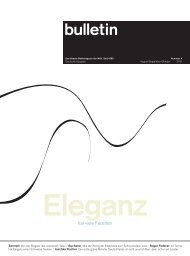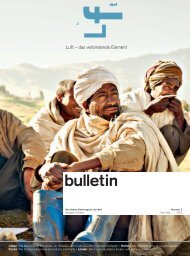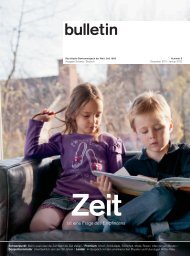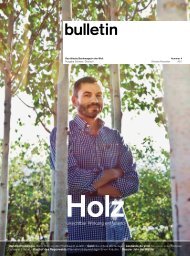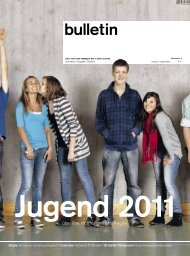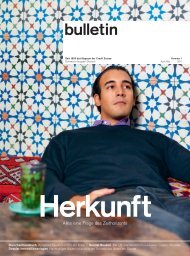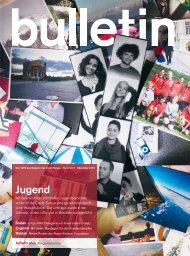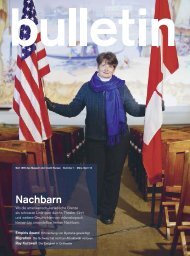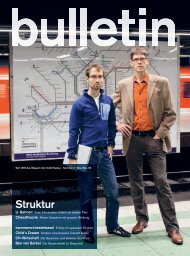Innovation
Global Investor Focus, 02/2007 Credit Suisse
Global Investor Focus, 02/2007
Credit Suisse
You also want an ePaper? Increase the reach of your titles
YUMPU automatically turns print PDFs into web optimized ePapers that Google loves.
GLOBAL INVESTOR FOCUS <strong>Innovation</strong> — 38<br />
Fertility<br />
Infertility increases with age<br />
First child birth by age group in the USA<br />
%<br />
70<br />
60<br />
50<br />
40<br />
30<br />
20<br />
10<br />
0<br />
Percent infertile Percent chance of remaining childless<br />
20–24 25–29 30–34 35–39 40–44<br />
90000<br />
80000<br />
60000<br />
40000<br />
20000<br />
0<br />
Age 35–39 Age 40–44<br />
1970 1986 1997<br />
Women today lead rich and demanding lives, full of opportunities.<br />
As a result, many of them choose to start their families later in life.<br />
But nature isn’t fair. While men can father children in their golden<br />
years, the female biological clock is far less forgiving. A woman’s<br />
fertility begins to decline at age 27 and significantly deteriorates<br />
after 35. By 40, her odds of conceiving are only about 5% each<br />
month. Currently the most widely used treatment for couples that<br />
would like to have children later in life is in vitro fertilization, but in<br />
the past few years there is increasing excitement about the new<br />
technology of oocyte cryopreservation, or egg freezing.<br />
One innovator in this field is Christy Jones, founder and CEO<br />
of Extend Fertility, a company that works with leading reproductive<br />
and medical research centers around the USA to offer women<br />
the opportunity to prolong their fertility using innovative eggfreezing<br />
technology. A seasoned entrepreneur with a successful<br />
track record of bringing new technologies to market, Christy was<br />
featured three times on the cover of Forbes, named a Top 100<br />
Young Innovator by MIT “Technology Review” and billed as one of<br />
the Top 20 Leaders under 30 by “Working Woman” magazine.<br />
Until recently, the procedure of egg freezing was restricted to<br />
young women facing chemotherapy, but since 2004, Extend Fertility<br />
offers it to any woman with healthy ovaries. Jones says that<br />
currently 60% of her clients go through the procedure for nonmedical<br />
reasons. While egg freezing does not guarantee a successful<br />
pregnancy, “it can greatly improve a woman’s chances of<br />
conceiving at age 40 and older, and gives women a sense of empowerment<br />
that they have taken advantage of all of their options,”<br />
says Jones.<br />
Because the human egg is large and contains a high percentage<br />
of water, it is highly susceptible to freezer burn. Recent advances<br />
in techniques for freezing eggs, however, have helped<br />
overcome this challenge, resulting in dramatically improved success<br />
rates. The procedure starts with hormone injections, which<br />
increase the number of eggs a woman produces to about a dozen.<br />
The eggs are then extracted, treated with a protectant and submerged<br />
into a tank of liquid nitrogen. Years later, eggs can be<br />
thawed and fertilized. The entire process lasts two weeks and<br />
costs between USD 10,000 and 15,000. The procedure, first performed<br />
in Italy in the mid-1980s, has resulted in more than 200<br />
successful pregnancies in the last few years. In the past year,<br />
eight babies have been born from frozen eggs at Extend Fertility<br />
clinics, with world-leading egg survival rates of over 80%. In April<br />
2007, a 36-year-old woman, who was enrolled in an Extend Fertility-sponsored<br />
research study, made history by giving birth to<br />
the first USA baby born from both a frozen egg and frozen sperm.<br />
The increased number of women who choose to become mothers<br />
later in life has spurred a tremendous growth in reproductive<br />
health clinics in the USA and Europe. Currently Americans spend<br />
over USD 1 billion a year on medical fertility procedures. The<br />
number of fertility clinics in the USA has grown from 200 in the<br />
mid-1990s to over 400 today. Extend Fertility alone has frozen<br />
the eggs of over 200 women in the past three years, and the<br />
number has doubled each year. The technology is still considered<br />
investigational in the USA, and in general, the Food and Drug<br />
Administration is putting tighter controls on fertility clinics. Jones<br />
suggests future clients and investors in the fertility field be very<br />
selective and choose clinics that invest in research and education,<br />
that can show a record of a significant number of pregnancies<br />
and that manufacture their product under current Good Manufacturing<br />
Process guidelines.<br />
While egg-freezing science is still new, it is promising and can<br />
give women another chance to take control of their reproductive<br />
health. “It’s our generation’s answer to the birth-control pill,” says<br />
Jones. “Our moms had the birth-control pill, and that gave them<br />
a lot of freedom, and the next generation will have egg freezing,<br />
and that will give them freedom in a different way.” Tania Dimitrova<br />
Source: American Society for Reproductive Medicine, A Guide for Patients, 2003, The National Vital Statistics Report, April 1999



